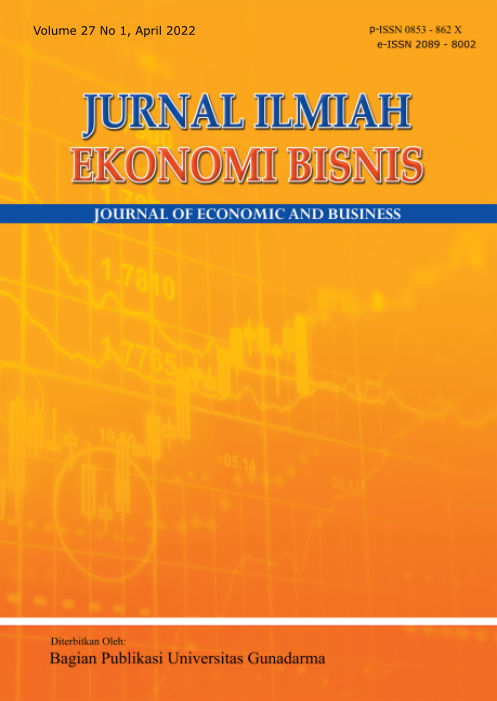HOW DIGITALISATION AFFECTING EMPLOYEES WELL-BEING DURING COVID-19 OUTBREAK: A META-ANALYSIS STUDY
Gunadarma University
Indonesia
Gunadarma University
Indonesia
Gunadarma University
Indonesia
Abstract
The COVID-19 pandemic is having a profound impact, with far-reaching impacts on the way people live and work around the world. The increasing digitization of the workplace during this pandemic has led to changes in working conditions, which can be a risk factor for decreased well-being and performance. Due to the social distancing requirements of the pandemic, workers have experienced a transformative change in working conditions with the rapid adoption of digital technology. The aim of this research is to conducted a literature study to explain especially how digital technology or digitization can affect employees well-being during the COVID-19 outbreak. The research method used is a literature study using 25 reviewed journals that published from 2019-2021. Research findings identify adverse psychosocial effects on the well-being of employees affected by digitalization during the COVID-19 outbreak, including: technostress, work stress, workload, anxiety, burnout, fatigue, and isolation.
Keywords
References
Abilleira, M., Rodicio-Garcia., M., Rios-de Deus., M., & Mosquera-Gonzales, M. (2021). Technostress in Spanish University teachers during the COVID-19 pandemic. Frontiers in Psychology, 12, 1-11. doi:10.3389/fpsyg.2021.617650.
Amankwah-Amoah, J., Khan, Z., Wood, G., & Knight, G. (2021). COVID-19 and digitalization: The great acceleration. Journal of Business Research, 136(2021), 602-611. doi:10.1016/j.jbusres.2021.08.011.
Ashcroft, R., Sur, D., Greenblatt, A., & Donahue, P. (2021). The impact of the COVID-19 pandemic on social workers at the frontline: A survey of Canadian social workers. The British Journal of Social Work, July 2021(bcab158), 1-23. doi: 10.1093/bjsw/bcab158.
Ayyagari R., Grover, V., & Purvis, R. (2011). Technostress: Technological antecedents and implications. MIS Quarterly, 35(4), 831-858. doi: 10.2307/41409963.
Barbuto, A., Gilliland, A., Peebles, R., Rossi, N., & Shrout, T. (2020). Telecommuting: smarter workplaces. Retrieved from: http://hdl.handle.net/1811/91648
Bordi, L., Okkonen, J., Mäkiniemi, J., & Heikkilä-Tammi, K. (2018). Communication in the digital work environment: Implications for wellbeing at work. Nordic Journal of Working Life Studies, 8(S3), 29-48. doi: 10.18291/njwls.v8is3.105275.
Borle, P., Boerner-Zobel, F., Voelter-Mahlknecht, S., Hasselhorn, H. M., & Ebener, M. (2021). The social and health implications of digital work intensification. Associations between exposure to information and communication technologies, health and work ability in different socio-economic strata. International Archives of Occupational and Environmental Health, 94(3), 377–390. doi:10.1007/s00420-020-01588-5.
Bozkurt, V. (2020). Working during a pandemic: economic concerns, digitalization, and productivity. The Covid-19 Pandemic and Its Economics, Social and Political Impacts (pp. 87-106). Istanbul, Turkey: Istanbul University. doi: 10.26650/B/SS46.2020.006.07.
Bregenzer, A., & Jimenez, P. (2021). Risk factors and leadership in a digitalized working world and their effects on employees’ stress and resources: Web-based questionnaire study. Journal of Medical Internet Research, 23(3). doi: 10.2196/24906.
Brussevich, M., Dabla-Norris, M. E., Kamunge, C., Karnane, P., Khalid, S., & Kochhar, M. K. (2018). Gender, technology, and the future of work. Washington, DC: International Monetary Fund.
Díaz, M. L., Cruz-Chávez, M. A., Juárez-Pérez, F., Enriquez-Urbano, J., Rivera-López, R., & Acosta-Flores, M. (2021). Optimization method to address psychosocial risks through adaptation of the multidimensional Knapsack Problem. Mathematics, 9,1-23.
Deci, E. L., Ryan, R. M., Gagné, M., Leone, D. R., Usunov, J., & Kornazheva, B. P. (2001). Need satisfaction, motivation, and well-being in the work organizations of a former Eastern Bloc country: A cross-cultural study of self-determination. Personality and Social Psychology Bulletin, 27(8), 930–942. doi:10.1177/0146167201278002.
Dubosson, M., Fragniere, E., Junod, N., Meier, S. &. Varone, S. (2019). Digitized governance to mitigate human-related risks: A software based on overall early detection. Proceedings of the 18th International Conference on Informatics in Economy. Education, Research and Business Technologies, (pp. 229-234). doi: 10.12948/ie2019.04.13.
Galanti, T., Guidetti, G., Mazzei, E., Zappalà, S., & Toscano, F. (2021). Work from home during the COVID-19 outbreak: The impact on employees' remote work productivity, engagement, and stress. Journal of Occupational and Environmental Medicine, 63(7), e426–e432. doi:10.1097/JOM.0000000000002236.
Gierveld, J.d., Tilburg, T. G., & Dykstra, P. A. (2006). Loneliness and social isolation. In A. Vangelisti, & D. Perlman (Eds.), The Cambridge handbook of personal relationships (pp. 485–500). Cambridge, UK: Cambridge University Press.
Goetz, T.M., & Boehm, S. A. (2020). Am I outdated? The role of strengths use support and friendship opportunities for coping with technological insecurity. Computers in Human Behavior, 107(2020), 106265. doi:10.1016/j.chb.2020.106265.
Johnson, J., Hall, L.H., Berzins, K., Baker, J., Melling, K., & Thompson, C. (2018). Mental healthcare staff well-being and burnout: A narrative review of trends, causes, implications, and recommendations for future interventions. International Journal of Mental Health Nursing, 27(1), 20–32.
Juchnowicz, M., & Kinowska, H. (2021). Employee well-being and digital work during the COVID-19 Pandemic. Information, 12(8), 1-13. doi:10.3390/info12080293.
Jukic, T., Ihan, A., Strojnik, V., Stubljar, D., & Starc, A. (2020). The efect of active occupational stress management on psychosocial and physiological wellbeing: a pilot study. BMC Medical Informatics and Decision Making, 20(231), 1-8. doi:10.1186/s12911-020-01347-z.
Karani, A., & Mehta, S.A. (2021). “I am OK when you are with me” – Understanding the well-being and innovative behavior in the digitized workspace. International Journal of Sociology and Social Policy. Vol. ahead-of-print No. ahead-of-print. doi:10.1108/IJSSP-05-2021-0127.
Köffer, S. (2015). Designing the digital workplace of the future – what scholars recommend to practitioners. Proceeding of Thirty Six International Conference on Information Systems-Exploring the Information Frontier, Fort Worth, Texas, USA, December 13-16, 2015.
Head of Magister Management and the Lecture in Industrial and Organizational Psychology of Science from Gunadarma University, Jakarta.


